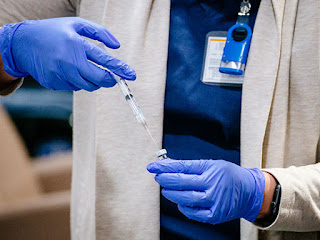Anti-spikes receptor binding domain (RBD) levels and short-term adverse event dynamics after heterologous booster administration of BNT162b2 after two doses of CoronaVac
CoronaVac was administered in early 2021 as the primary COVID19 vaccine for Thai healthcare professionals (HCWs) in response to a new variant epidemic. The purpose of this study is to evaluate the dynamics of the humoral immune response and the short-term side effects resulting from the additional administration of BNT162b2 after the completion of two doses of CoronaVac in Thai healthcare professionals. This study was conducted in August and September 2021 at a teaching hospital in northern Thailand. Participants were 50 healthcare workers vaccinated with two doses of CoronaVac and were expected to receive an additional dose of BNT162b2. We evaluated AntiSARSCoV2 IgG antibody levels and short-term side effects. Anti-RBD levels were determined using Architect SARSCoV2 IgG II Quant (Abbott). Of the 50 participants, 37 were women. The average age was 33.0 years. The average time between the second CoronaVac vaccination and the BNT162b2 booster was 81.7 days (SD = 25.0). Median anti-SARSCoV2 IgG antibody levels on booster and 14 and 28 days after booster were 335.5 AU / mL, 31,613.5 AU / mL, and 20,311.9 AU / mL, respectively. After 14 days of booster immunization, 94% of participants showed anti-SARSCoV2 IgG antibody levels above 50.0 AU / mL. Being a woman, the higher the logarithmic value of anti-SARS CoV2 IgG antibody before booster immunization, and the longer the interval between the second vaccination and booster immunization, the higher the level of anti-SARS CoV2 IgG antibody on both days 14 and 14. Turned out to be higher. 28 days after the booster. There were no reports of serious adverse events. A booster dose of BNT162B2 promoted high levels of anti-SARSCoV2 IgG antibody in healthcare professionals who received two CoronaVac doses. The period from the second CoronaVac vaccination to the booster vaccination should be at least 3 months. No serious side effects were observed. The coronavirus disease (COVID19) pandemic has caused more than 240 million infections and 4.9 million deaths worldwide, and Thailand is affected by this global catastrophe. I will not receive it. The epidemic in the region was suppressed for most of 2020, but the situation worsened in April 2021. B.1.617 (Delta), B.1.1.7 (Alpha), and B.1.351 (Beta) replaced wild-type viruses, resulting in widespread infection and a sharp increase in hospitalization. Recently, the total number of cases recorded quickly exceeded 1 million, with 10,000 to 20,000 new infections reported daily. Despite physical distance, outdoor masking, hand hygiene, travel restrictions, curfew, meeting restrictions, telecommuting, and other illness measures, this epidemic is a national society. It has a serious impact on the economy and health sector.



Comments
Post a Comment